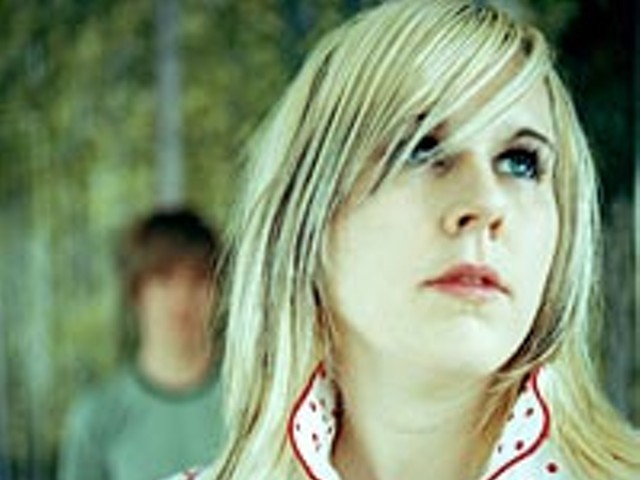For once, judge the book by its cover. The back cover.
The back cover of Nash Kato’s solo album, Debutante, presents a portrait of an immaculate rock ’n’ roll idol. It’s partly the angle — what would be called a “hero shot” in advertising. The camera is placed at Kato’s knees and his body stretches up to the top of the frame in the lean, perfect pyramid. If he were on stage, this would be the neck-aching vista from the very front row. If he were in front of you, you’d be groveling at his feet.
In that photo, Kato is dressed entirely in white. White pants, white belt, white T-shirt. His expressionless face is shielded by white-framed Elvis-style shades and outlined by chestnut hair that cascades to his shoulders. Above him, the white light of the sun envelops the top of his head in ethereal halo against the too-blue sky. It’s true that a picture is worth a thousand words, but this one only needs six — and they’re broadcast like a brilliant neon billboard that you can read from miles away: Nash Kato is a rock god.
But he isn’t. He never was. He probably never will be. Practically no one heard Debutante, and many who did hated it. It was lambasted by critics and ignored by the public. (To this day you can’t even download the damn thing.) When it came out in 2000, the public reaction was clear. Nash Kato — once a drug-addled godhead at the helm of 1990s near-stars Urge Overkill — didn’t get the memo: Grunge had overthrown champions of rock excess, and Kato’s posture as a hipster update of Michelangelo’s “David” didn’t impress anyone.
The back story, the long road that led Kato from his smart-ass Minnesota childhood to that photo session, is one marked with astonishing bad luck and constant flirtation (even heavy petting) with bona fide superstardom. It’s the story of Nash Kato, the almost-legend.
The “Behind the Music” storyboard on Urge Overkill would go like this: While at Chicago’s Northwestern University, Kato and two pals start a gag band with tongue-in-cheek rockstar ’tudes. After a couple records on Chicago indie Touch and Go, they start getting popular. It looks like they’re going to go all the way, especially when Gen-X film director Quentin Tarantino picks up their Stull EP in a London cut-out bin. He makes the band’s dusty cover of a Neil Diamond classic (“Girl, You’ll Be A Woman Soon”) the runaway single from the Pulp Fiction sound track and boom — MTV, piles of cash, a major label, the whole nine. The trio buys into their own myth. Toting trophy girlfriends and pricey dope habits, they start to embody the lifestyles that they initially mocked.
And then, just when it’s about to get really, really big, the house of cards starts to tumble. Drummer Blackie Onassis gets pinched on drug charges. The public doesn’t really understand ironirock shtick. They get blue-balled by their major label (after selling a “disappointing” 275,000 copies of 1995’s underrated Exit the Dragon) and blackballed by the indies for selling out. Egos clash and the band breaks up. Kato releases an unheard solo record, Debutante, and goes on a junkie’s junket to Costa Rica, never to be heard of again.
But, now, five years later, Urge Overkill announces a reunion.
Who cares, right? The story is maddeningly predictable, but when you couple it with the music — major label albums of huge, cocksure riffs on 1993’s Saturation and, to a lesser extent, 1995’s Exit the Dragon — Urge Overkill’s masterful imitation of rock’s icons made them into icons themselves. They leave you two choices: Either regard Urge Overkill as rock mockers who have a masochistic (anti-careerist) sense of humor, or give in, turn the records up real loud and buy into it, hook, line and sinker. Before you go with the former, study Nash Kato’s pose on the back of Debutante for a while. It’s not a pose at all. It’s the real (yes, real) goddamned thing.
“Hang on, hang on, hang on.” It’s Kato’s voice over the phone. He’s ordering fast food at a drive-through and can’t be distracted by another pithy interview. Nash hates doing interviews on the phone, his manager has cautioned me earlier in the week. I’ll ask him, manager assures, but I don’t think it’s going to happen. But it’s happening. And, if Kato was playing the role of self-involved rock messiah during UO’s peak, his manners on the phone are evidence that he’s matured perfectly into the next role, as the rather rusty comeback kid, ready to step back into the ring, invited or not.
“I’ll tell you one thing about that record.” Kato responds when I gush about Debutante. “To tell you the truth it was the best-kept secret of the time. I’m not sure anyone knew it was released. Shit, I forget it was released.”
His candor on the phone brings to mind a B-rate Diamond Dave. He speaks in a stream of interviewee clichés: about “what a rush it is” to be “getting back in the saddle” for the Urge reunion, which is, you guessed it “for the fans.” Understand now, dear reader, Nash Kato isn’t about to dole out a post-structuralist epithet about the mystical powers of his art. He’s going to talk about “sex, drugs and rock ’n’ roll,” a phrase which — by the way — he uses approximately once every two minutes during the duration of our conversation. It’s not that Nash Kato isn’t a sharp dude — his records brim with brainy turns of phase — but his intelligence isn’t dedicated to being a good interview, it’s about being a cult of personality, about being a classic showman, about writing rock songs.
Ask him about his well-documented enthusiasm for narcotics and he scoffs. “Pish posh, that’s the kind of legacy that follows every band. Sex, drugs and rock ’n’ roll. That’s the job description. That’s the good part of being in a rock band. It’s the kind of stuff I dropped out of the college for.”
Ask him if he feels strange that the popularity of the band’s Neil Diamond cover eclipsed his own compositions. “We can’t complain about that runaway load of shit,” he says. “I just wish I had a written it. I’d be speaking to you poolside at a place in the Hollywood Hills. That fucking song did more for us in two minutes of a movie than 10 years touring. The real punch line is that we only recorded it to get out of contractual obligations and we did it for a six-pack and bag of weed.”
Ask him about his dodgy reputation as a vain egoist, about how indie rock kingpin Steve Albini called the band “freakish, attention-starved megalomaniacs” and he doesn’t bat an eye. “There was a while where we were burning pretty hot, things would snowball out of control. Vain? You could call it vain if you wanted to. But I always enjoyed looking good, even though it wasn’t cool to look good for a while. But style is part of a show. That’s an old-school idea, from one old-schooler to another. When you get on stage you have to look good, and we did. We still do.”
Imagine Nash Kato. Imagine him looking good, dressed in impeccable, spotless white, just like that picture on the back cover of Debutante. Imagine him blowing by in the passing lane of some Chicago highway with the top down to some slightly out-of-style muscle car. One hand holds the phone up to his ear; the other is draped over the wheel as he weaves through traffic with the casual dignity of a slow dance.
Now, try to get him to say something that means anything. Try to get him to say something real, something that is actually happening behind those mirrored sunglasses. Ask him if he has any regrets.
“I spent a lot of time chasing the sun,” he says. It’s impossible not to picture the white orb of that shot on his CD, the one that engulfs his head in a divine halo. “Sometimes I got too close to see anything else.”
Urge Overkill will perform Thursday, April 15, at the Magic Bag (22920 Woodward Ave., Ferndale). The Pieces and Until Sunday support. Call 248-544-1991 for info.
Nate Cavalieri is a freelance scribe. E-mail [email protected]




